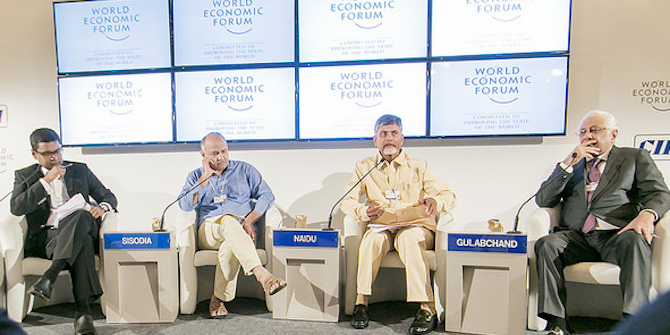More than 12 million people, or 68 per cent of eligible voters, went to the polls in Gujarat on Thursday. Brajesh Kumar describes how a local school in Dugheri was transformed into a polling booth for the day.
Dodiya Bhavsinh and Narendra Jotava arrived at the primary school in Dugheri, the polling station for the village, around 11 am on Wednesday, December 12. Both teachers at the school, they are the booth level officers (BLOs) for Thursday’s polling and my guides in shining armour on D-day.
“We have to ready the room for work to start before the polling officials arrive from Bhavnagar,” Bhavsinh said.
The school, which has students up to class VIII, is at the entrance of the village —a single-storey yellow building with brick-tiled roof and high ceiling. It’s in fairly good condition with neatly arranged furniture in each classroom and steel almirahs that are yet to gather rust, a revelation after the weeks spent in Sirohi, Abu Road, Rajasthan. The gate leads to an open space surrounded by buildings on three sides. A huge neem tree stands at the centre of the open space.
Bahvsinh and Jotava opened the gates of polling booths number 68 and 69, two classrooms, and rearrange the desks inside. While class VII would serve as polling booth number 68, class IX has been converted into booth number 69. Bhavsinh, in charge of booth 68, then wrote the number of voters on the blackboard: 887 (455 M, 432 F — or male and female voters), along with his name and mobile phone number.
His colleague Jotava, in charge of booth 69, did the same in the other room: total voters 953 (500 M, 453 F).
While the BLOs can be locals (as Bhavsinh and Jotava are), the rest of the polling officials (comprising four polling officers, including a presiding officer) are from outside Mahuva. “Election commission rules say they cannot be locals,” Jotava said.
Bhavsinh, meanwhile, sent for mattresses to be used by the polling officials during their overnight stay in the school. They also made arrangements for food to be cooked on the school premises. “We use the materials out of midday meals scheme run by the central government,” Bhavsinh said.
The real preparation starts
At about 3 pm, a Gujarat state road transport corporation bus (popularly called STC bus) rolled in, carrying polling officials and a team of BSF personnel. Suresh Bhatia, a teacher at a government school in Gariadhar, is the presiding officer of booth number 69. Along with him are three other officials who are called P1, P2 and P3 (‘P’ stands for polling officer), each of whom will be assigned a responsibility on the polling day. The officials get to work soon as Bhatia led them team inside the booth.
From a huge bag he was carrying — the election kit — Bhatia took out poll material such as posters, colourful (mainly red and green) forms, stapler, pins, candle, rope, stamp, seal and matchbox. The first task is to stick the posters, Bhatia said. The first poster, put up on the wall outside the booth, lists the options from among identity cards a voter would need to exercise her/his democratic right.
The list includes, among others, passport, pan card, driving licence, property papers, NREGA job card, arms license, freedom fighters’ certificate, OBC certificate and handicap certificate. Three other posters said, ‘keep silence’, ‘stand in queue,’ and ‘smoking prohibited’ — all put up on the wall outside the polling booth.
Once the posters were pasted, Bhatia and his team got down to the tedious paperwork: the green and red forms were spread on the table, to be filled in due course. “We have to account for each and every item in the kit before and after polling,” Bhatia said.
Breaking the ice with security in-charge
Outside the booth, Kuldeep Singh, a BSF hawaldar and leader of the paramilitary team of four, instructed one of his jawans to close the school gate, even as the remaining two lay down in one of the rooms with mattresses spread on the floor.
I gingerly approached Kuldeep Singh, who stood upright with an automatic weapon (I don’t know whether it is AK-47 or -56 but it looked deadly all right) slung on his shoulders. Aware of the fact that Singh is crucial to my entrance in the school compound on the polling day (I do not have permission to enter the polling booth and Singh has every right to throw me out of the school premises), I did not want to offend him in any way.
By his name, written in bold on his right pocket, and his stocky build I assume he is a north Indian and in all likelihood either a Punjabi or a Jat. “Aur sirjee, kaise ho (so, how are you doing, sir),” I greeted him. He looked at me intently for a few seconds before the freeze thawed. He smiled and shook my extended hand: “Acha, to tum Gujarati nahin ho (okay, so you are not a Gujarati),” he replied with a big grin.
Please sit, he said, pulling up a chair for me. He seemed genuinely happy to have met an outsider, especially one who spoke Hindi, in Gujarat. I introduced myself, told him about my research and the need for my presence in the school compound on the polling day. “If the presiding office permits you we won’t have any problem,” he replied.
“Oh, don’t worry about that; Mr Bhatia has already given me permission,” I told him.
Security details on D-day
Having broken the ice with Singh I asked him about the security structure in the polling booth. “We are responsible for bringing in polling officials to the booth, maintaining security on the polling day and then escorting the polling staff to the election office in the district headquarters,” he said.
The BSF/paramilitary forces form the innermost security ring on the polling day, with the outer ring (outside the polling station) taken care of by the local police, he told me.
Inside polling booth number 69, Bhatia and his team, meanwhile, tired of the tediousness of filling up of numerous forms, had broken for tea. They did not leave the room, though. “Too much work,” Bhatia said as I approached him, “and it will go on till midnight.”
So you people would not manage a good night’s sleep, I put in.
“No, we will wake up at 4 or 5 am and get to work. We will conduct a mock poll at 7 am to check our preparedness. Come tomorrow morning and see for yourself,” he said, and got back to his work.
There, the permission to enter the premises had come without even having to ask for it! It was 10 pm by the time I left the place.
Click here for more Gujarat election coverage from Governance Now. This post is part of a study into the meaning that elections hold for the electorate that is currently being conducted during the state-level Vidhan Sabha elections in the state of Gujarat. The principal investigator of this project, ‘Panchayat and Vidhan Sabha elections 2012-2015′, is LSE’s Dr Mukulika Banerjee (part of the European Research Network Programme: Explaining Electoral Change in Rural and Urban India).







